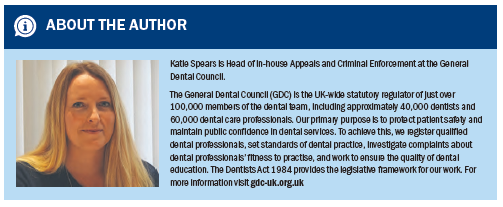If you’re thinking about getting your teeth whitened, there’s some important things to know before going ahead. Here’s how to stay safe and make sure the treatment is legal.
We live in a world of social media and reality TV so it’s hard to escape images of the body-beautiful which greet you every time you turn on the television or hop on Instagram. For some, seeking aesthetic perfection includes what they see in the mirror when they crack a smile, so it is not surprising that getting your teeth lightened up a few shades in search of that Hollywood smile is more popular than ever.
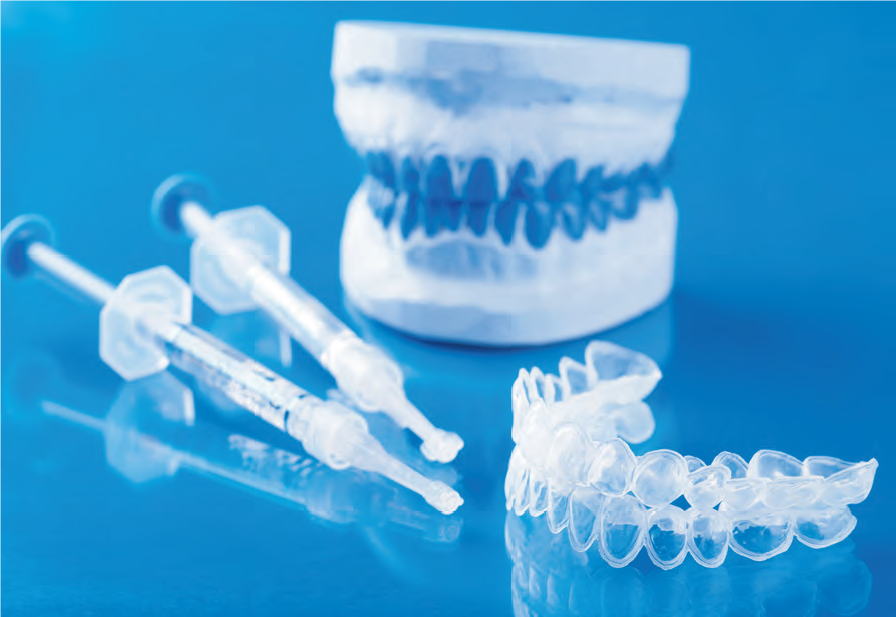 A problem sometimes arises though when a visit to the dentist results in a proposed bill which will run to several hundred pounds. It is then perhaps also not surprising that we continue to see people turning elsewhere, often to high street beauty salons or responding to online adverts, which claim to offer the same dental treatment at a cut price. The problem though is that it is a dental treatment. To be legal for the person providing it and, more crucially, safe for the individual receiving it, it must be offered by a trained and registered dental professional.
A problem sometimes arises though when a visit to the dentist results in a proposed bill which will run to several hundred pounds. It is then perhaps also not surprising that we continue to see people turning elsewhere, often to high street beauty salons or responding to online adverts, which claim to offer the same dental treatment at a cut price. The problem though is that it is a dental treatment. To be legal for the person providing it and, more crucially, safe for the individual receiving it, it must be offered by a trained and registered dental professional.
The law in the UK is very clear that tooth whitening is a dental treatment that can only be performed by a registered dentist or a dental therapist, dental hygienist or a clinical dental technician working to the prescription of a dentist. This is set out in legislation (Dentists Act 1984) and has been confirmed in case law by the High Court in GDC v Jamous in 2013. Offering tooth whitening if you are not a registered dental professional is a criminal offence which carries a potentially unlimited fine and a criminal record.
But why is this?
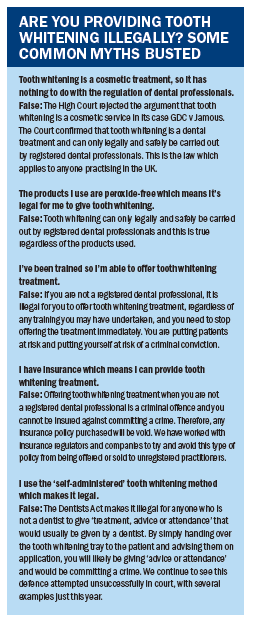 When the General Dental Council (GDC) prosecutes people for illegally practising dentistry, we are sometimes accused of simply acting to protect dentists’ financial interests. To be clear, the GDC is the regulator of the dental professions. It is not an association for dentists but rather we are here to protect the public. We are tasked with maintaining high standard in dentistry, in the interests of protecting public safety, and it is for this reason that we pursue those we suspect of offering dental treatment illegally.
When the General Dental Council (GDC) prosecutes people for illegally practising dentistry, we are sometimes accused of simply acting to protect dentists’ financial interests. To be clear, the GDC is the regulator of the dental professions. It is not an association for dentists but rather we are here to protect the public. We are tasked with maintaining high standard in dentistry, in the interests of protecting public safety, and it is for this reason that we pursue those we suspect of offering dental treatment illegally.
Dentists are highly trained professionals and must have completed at least five years of training (equalling at least 5000 full-time hours) in order to qualify to practise in the UK. This training means they are able to assess a patient’s suitability for the treatment. For some people it is unsafe to have their teeth whitened, such as those who suffer from gum disease or micronutrient deficiency, as the treatment can damage their teeth and gums.Crucially, dentists’ and dental care professionals’ level of expertise also means they are able to react quickly in cases where an emergency arises. These are skills and expertise that simply cannot be gained from a short course, which is what we typically see with people who are offering tooth whitening illegally.
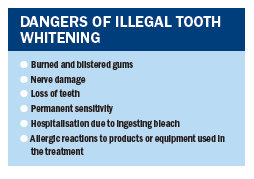 To practise in the UK, dental professionals are legally required to register with the GDC. This is important because it provides the patient with certainty about the person undertaking the treatment. For example, it guarantees that the person will be held to the high professional standards that are set in the UK and that their training and education will be kept up to date. It also means that the individual will be indemnified (insured) so should something go wrong as a result of poor care, there will be a route through which compensation can be gained.
To practise in the UK, dental professionals are legally required to register with the GDC. This is important because it provides the patient with certainty about the person undertaking the treatment. For example, it guarantees that the person will be held to the high professional standards that are set in the UK and that their training and education will be kept up to date. It also means that the individual will be indemnified (insured) so should something go wrong as a result of poor care, there will be a route through which compensation can be gained.
So, what are the dangers?
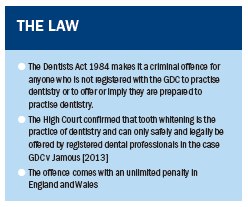 In the four years I have worked at the GDC I have seen a really wide range of injuries that can be suffered by the unsuspecting victims of this crime.
In the four years I have worked at the GDC I have seen a really wide range of injuries that can be suffered by the unsuspecting victims of this crime.
The most common injuries we see are burned and blistered gums. Thankfully the effects of these injuries are, in most cases, temporary but in the more serious instances I have seen this lead to permanent nerve damage, permanent gum and tooth sensitivity and loss of teeth. I have also seen cases where the victim has needed to be admitted to hospital due to ingesting the bleach solution which caused dangerous dehydration and internal burns.
I said earlier that our primary interest is protecting the public and so you can see, with the injuries that can arise, why it is important for the GDC to continue tackling illegal tooth whitening.
But we do have limited resources – being funded almost entirely from registration fees that dental professionals pay – and for this reason, we are dependent on members of the public helping us to understand where illegal tooth whitening is happening by reporting it to us. It’s really easy to check if someone is on the register of dental professionals and to report cases of suspected illegal tooth whitening both via our website gdc.org.uk.




